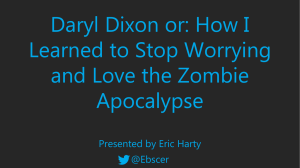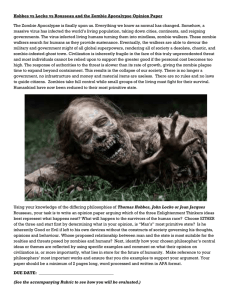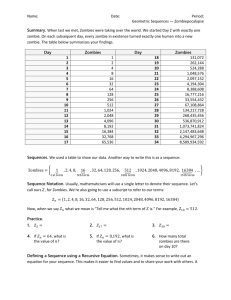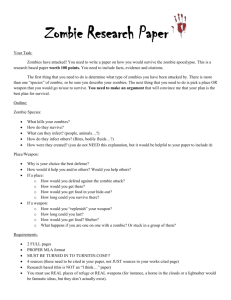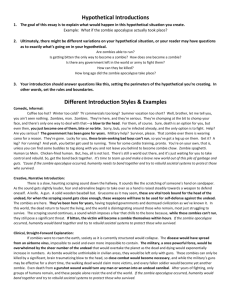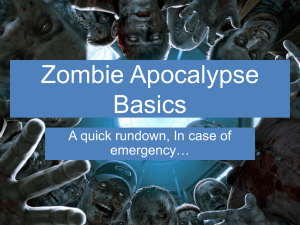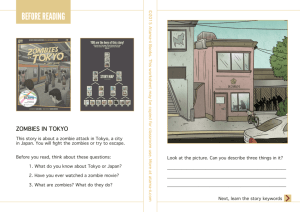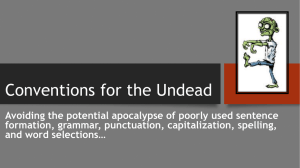simple sentence
advertisement
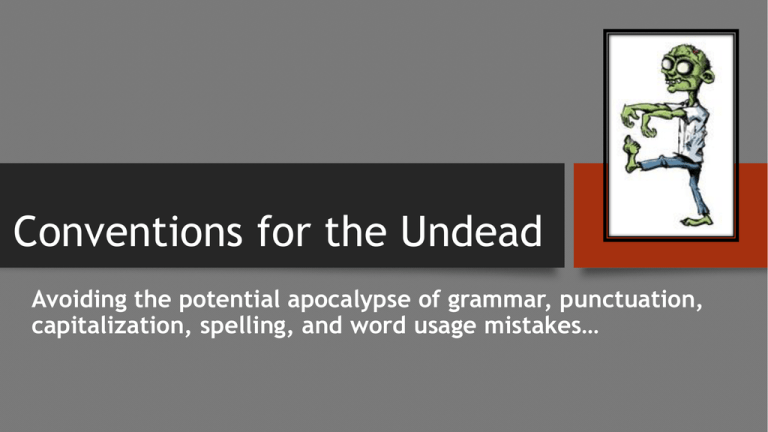
Conventions for the Undead Avoiding the potential apocalypse of grammar, punctuation, capitalization, spelling, and word usage mistakes… Simple Sentences A simple sentence is a complete thought. • Subject(s) + Predicate(s) (the verb and any additional information) Examples: 1. Zombies have feelings. 2. Zombies and humans have feelings. 3. Zombies and humans have feelings and crave food. Your Tourniquet: Simple Sentences On a fresh sheet of tree flesh, complete the following sentences. 1) The most experienced morticians in the department ______. 2) A track of muddy footprints ______________. 3) No one else in the town ____________________. 4) Those rusty scissors _____________. Compound Sentences *FANBOYS: for, and, nor, but, or, yet, so A compound sentence contains two or more simple sentences joined by a comma and a coordinating conjunction (*FANBOYS). Examples: 1. The explosion erupted loudly, and the city turned into darkness. 2. Screams echoed through the streets, yet not a soul was heard. 3. The outbreak followed, for the radiation spread with the aftermath. Your Tourniquet: Compound Sentences On the same sheet of tree skin, complete the following sentences. Don’t forget to use a FANBOY. 1) My heart began to race, _____. 2) A foul stench came from the basement, ______. 3) Broken glass lined the hallway, __________. 4) Faint carousel sounds entered the closet, ______________. Fragments and Run-Ons A fragment is an incomplete thought, lacking either a subject OR predicate. Examples: 1. The smell of death. 2. Drudging through the streets. A run-on sentence is when your sentence continues forever and ever and you never stop but you just can’t help it so you continue because it’s the way to talk and you think that’s okay but you’re reader runs out of breath like being chased by a zombie and getting bitten and turning undead forever. *Fragments can be beneficial when used for dramatic purpose! Double Tap the Double Negatives • A double negative occurs when you word your sentence in a way that contradicts the intended meaning. Example: 1. I have not never been bitten by a flesh eating corpse. Comma Usage • Direct Address (ex. Students, pay attention. Dear Zombie, listen.) • Comma Splice (ex. Humans have hearts, zombies have undead hearts.) • Words in a Series (ex. Pancreas, intestines, brains.) • Brush Strokes (ex. Sprinting down the field, the zombies approached me, as I was running towards them.) • Complex Sentences (ex. Although it was probably not a wise idea, to run towards the zombies.) • Coordinating Adjectives (Adjectives in a Row) (ex. The unsightly, repugnant, and blind, Chinese Crested hairless dog lunged at my poor Poodle.) Comma Coma Command Find a person next to you (unless you are alone) with whom to recite the following series of words. Take turns reciting them back and forth; slowly at first, then quicker-- alternating sets. Finally, add words that begin with ca if you feel confident again. This is the Comma Coma Command. First Set: “Car, Care, Cake, Can, Cat, Cabbage, Captain, Candle.” Second Set: “Camp, Candy, Card, Capture, Carriage, Carol, Caption, Captain.” Keep Calm and Carry On. Use this exercise to keep calm during zombie attacks. Complex Sentences • A complex sentence is a sentence with an independent clause and a dependent clause. A dependent clauses often answers how, why, where, or when, of the independent clause, and can not be separated from it. Example: After society crumbled, hysteria ensued. (When did hysteria ensue?) Those still alive, listened to the swarms of undead below. (Where were the undead? Where were those still alive?) Your Tourniquet: Complex Sentences Finish the following complex sentences. 1) Although survival during a zombie apocalypse is difficult, __________________. 2) __________________, until she described it. 3) __________________, while house fell into a sinkhole. 4) Whether you are prepared or not, _________________. Word Usage • Subject/Verb Agreement > Singular Subjects/Singular Verbs, Plural Subjects/Plural Verbs > Ex. The zombie is alone. The zombies are together. • Verb Tense > Ex. Jump/Jumping/Jumped/Will Jump, Drive/Driving/Drove/Will Drive, Am/Is/Was/Were. • Passive/Active Voice > Passive- action is performed upon the subject. Active- action if performed by the subject. Ex. The torso was eaten by the zombie. (passive) The zombie ate the torso. (active) Apostrophes • Contraction- Can not/Can’t, Do not/Don’t, Should not/Shouldn’t. Note: Only zombies use contractions in academic writing! • Possessive Nouns- show ownership or relationship. Ex. The Zombie’s fork, My sister’s husband. Quotations Marks • Direct vs. Indirect • Direct- exacts words a person said. • Indirect- words are changed into your own words (Paraphrase). “I’m starving,” yelled the zombie, “for your brain.” (Direct) The zombie said, “I’m starving for your brain.” (Direct) The zombie said that they were hungry for my brain. (Indirect) (Note: punctuation goes inside quotation marks) Capitalization Capitalize: The zombie was tired of smelling like a corpse. (First Word of Sentence, or Line of Poetry) Akeem “The Dream” Olajuwon (Proper Nouns, Any Titles that Accompany them, or adjectives from them) Eiffel Tower, Orlando Arena, Toyota Prius, Apple I-pad, the Superbowl (Particular Structures, Special Events, Vehicles, and Brands) Jupiter, Atlanta, Europe, North ___ (Places, Geographical Regions, and Directions) Friday, September, Labor Day (Days of the Week, Months of the Year, and Holidays) Capitalization Continued Harlem Renaissance, the Oscar’s, Declaration of Independence, Brown v. Board of Education (Historical Periods, Events, and Documents: Names of Legal Cases, Awards) Surrealism, Modernism, Cubism (Philosophic, Literary, and Artistic Movements) African-American, Korean, Buddhism (Races, Ethnic Groups, Nationalities, and Languages, Religions) Capitalization Continued Democratic Party, One Direction, Orlando Magic (Political, Social, Athletic, Groups -> even Abbreviated Groups like NYPD: New York Police Department or UCF: University of Central Florida) Language Arts, Shakespearean sonnet, Congress, Environmental Protection Agency, Milwee Middle School, Kindle, The Hunger Games, I, Dear, Sincerely (Academic Subjects, Adjectives formed from Proper Nouns, Government/Education Agencies, Trade Names/Brand, Titles to Books, Movies, Albums, the Pronoun “I”, Letter Beginnings/Closings) Your Tourniquet: Capitalization Decapitation Problem: All the words begin with a capital letter in the following paragraph. Your Mission: Decapitate every word that is capitalized incorrectly. Last Saturday, After Picking Up A Copy Of The Orlando Sentinel Outside, I Found A Letter With Blood On It. I Opened It, And Discovered A Newspaper Clipping With Information About A Recently Deceased French Scientist, Charles Adolphe Faux-Pas Bidet, Whose Death Has Baffled Authorities. It All Started When Lieutenant Georges, While Answering A Noise Complaint About Creepy Sounds Coming From Bidet’s Garage, Stepped Into A House Filled With___. Frequently Misused Words • • • • • • • • • • There vs their vs they’re Affect vs effect Too vs two vs to Accept vs except Complementary vs complimentary Loose vs lose Of vs have Sight vs site vs cite Than vs then Who’s vs whose/ Your vs You’re Dead Words… Not even Zombies would bite that… • • • • Cause (or cuz) vs because Gonna, gotta, wanna, shoulda, coulda, woulda Text talk… lol, lmfao, btw, yolo, omg, plz Avoid using: really, very, a lot, so. Ex: Most people think surviving the apocalypse is very hard. Most people think that surviving the apocalypse is difficult. Cannibalism is really controversial. A lot of zombies…(Many) A lot of time…(Much) Also avoid using there is/there are > There are many traps made by citizens to fight zombies. The citizens make many traps to fight zombies.
